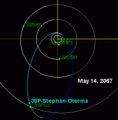Centaur (planetoid) facts for kids
A Centaur in astronomy is a small object that travels around the Sun. These objects are a bit like asteroids and a bit like comets. Most Centaurs orbit between the giant planets Jupiter and Neptune. Sometimes, they can even be found closer to the Sun, near Mars. Because they cross the paths of the outer planets, they are also known as "outer planet crossers."
| The Solar System | |||||||
|---|---|---|---|---|---|---|---|
|
|
|||||||
| Sun • Heliosphere |
Planets ☾ = moon(s) ∅ = rings |
Mercury | Venus | Earth ☾ | Mars ☾ | ||
| Jupiter ☾ ∅ | Saturn ☾ ∅ | Uranus ☾ ∅ | Neptune ☾ ∅ | ||||
| Dwarf planets | Ceres | Pluto ☾ | Haumea ☾ | Makemake | |||
| Eris ☾ | |||||||
| Small Solar System bodies |
Asteroids (minor planets) |
Groups and families: Vulcanoids · Near-Earth asteroids · Asteroid belt Jupiter Trojans · Centaurs · Neptune Trojans · Asteroid moons · Meteoroids · Pallas · Juno · Vesta · Hygiea · Interamnia · Europa |
|||||
| See also the list of asteroids. | |||||||
| Trans- Neptunians |
Kuiper belt – Plutinos: Orcus · Ixion – Cubewanos: Varuna · Quaoar · Huya |
||||||
| Scattered disc: Sedna | |||||||
| Comets | Periodic comets and non-periodic comets Damocloids · Oort cloud |
||||||
| See also the list of solar system objects | |||||||
Contents
What are Centaurs?
Centaurs are icy, rocky bodies that share features of both asteroids and comets. They are usually much smaller than planets. Scientists believe they are made of a mix of ice, dust, and rock. Unlike typical asteroids, Centaurs often show some comet-like activity. This means they can develop a fuzzy atmosphere, called a coma, or even a tail when they get closer to the Sun.
Where do Centaurs come from?
Scientists think Centaurs come from the Kuiper Belt. This is a large ring of icy objects beyond Neptune. Over time, the gravity of the giant planets can pull these objects inwards. This makes them move into new orbits between Jupiter and Neptune. Centaurs are like a temporary stop for these objects. They are on their way to becoming either short-period comets or crashing into a planet or the Sun.
How do Centaurs behave?
The orbits of Centaurs are not stable. They are constantly being affected by the strong gravity of the giant planets. This means their paths around the Sun change a lot over thousands of years. Some Centaurs might eventually get thrown out of the Solar System. Others might fall into the Sun. Some could even become active comets that visit the inner Solar System more often.
Famous Centaurs
One of the most famous Centaurs is Chiron. It was the first one discovered in 1977. Chiron is quite large, about 200 kilometers (124 miles) wide. It sometimes shows a coma, acting like a comet. Another well-known Centaur is Pholus. It has a very red surface, which scientists are still trying to understand. Nessus is another interesting Centaur. It has one of the longest orbital periods known for these objects.
Why are they called Centaurs?
The name "Centaur" comes from Greek mythology. In myths, a Centaur is a creature that is half-human and half-horse. This name was chosen for these space objects because they are also "half-and-half." They are not quite asteroids and not quite comets. They share characteristics of both. This makes the name a good fit for their mixed nature.
Images for kids
-
The semi-major axis of Asbolus during the next 5500 years, using two slightly different estimates of present-day orbital elements. After the Jupiter encounter of year 4713 the two calculations diverge.
See also
 In Spanish: Centauro (astronomía) para niños
In Spanish: Centauro (astronomía) para niños
 | Emma Amos |
 | Edward Mitchell Bannister |
 | Larry D. Alexander |
 | Ernie Barnes |



